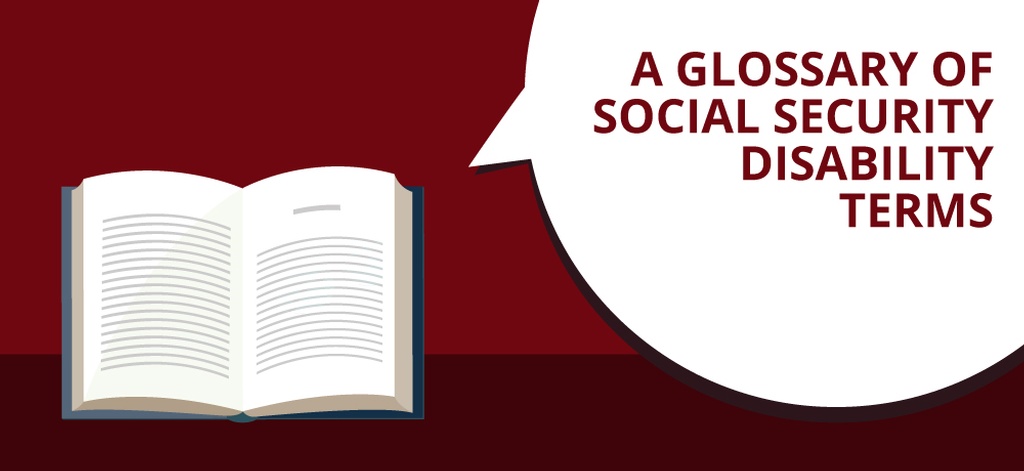
Those who want to qualify for Social Security Disability benefits have to first understand the different language and terms used in a disability claim in order to get approved. However, these words and phrases can be confusing to anyone who hasn’t undergone the Social Security disability application process.
To help you understand the terms, acronyms, and phrases used in a disability claim, the attorneys at Phillips and McCrea have created this handy reference guide on social security disability terms. Here you’ll find valuable information allowing you to comprehend and communicate your social security disability needs.
Substantial Gainful Activity (SGA).
“Substantial” work activity involves doing significant physical and/or mental activities. “Gainful” activity is determined by looking at the earnings of the claimant to determine if they meet a designated dollar amount.
Past Relevant Work.
When someone applies for Social Security Disability Benefits, the Social Security Administration usually considers work that has been performed in the last fifteen years or fifteen years prior to the date last insured. However, the work must be at the SGA level and must last long enough for the claimant to develop the skills to perform the job.
Date Last Insured (DLI).
DLI refers to the last date you are eligible to receive Social Security Disability Insurance (SSDI). In order to receive SSDI, you must pass the “recent work test.” This means that you need to have worked for at least five out of ten years prior to the date on which you applied for Social Security Disability benefits. More specifically, you must have worked twenty of the last forty quarters.
Residual Functional Capacity (RFC).
RFC determines the level of exertion that you are capable of doing and the restrictions that limit your job as a result of your disabling condition(s).
Alleged Onset Date (AOD).
AOD represents the day that you became disabled or the date at which you stopped working as a result of your disability. This implies more than just not working because the job ended, or the company laid off employees. This date indicates that you could not work any longer because of your disabling condition.
Unsuccessful Work Attempt (UWA).
UWA refers to work that lasted up to six months, which was stopped by the claimant as a result of the disabling condition or impairment.
Impairment Related Work Expenses (IRWE).
IRWE are out of pocket medical expenses that are used to treat the disabling impairments. These may be deducted from a claimant’s monthly earnings after determining that the work is SGA.
Reconsideration.
When the Social Security Administration denies your initial claim for Social Security Disability, you have the option to file an appeal. The first step to this appeal process is known as reconsideration.
Vocational Expert (VE).
A vocational expert is a person who is present during an appeal to the Administrative Law Judge or the hearing. He or she provides the Administrative Law Judge (ALJ) with information regarding the jobs that a claimant can qualify for, if any exist in the national economy. He or she provides this information after listening to the testimony of the claimant during the hearing in conjunction with the Residual Functional Capacity (RFC) retained by the claimant.
Social Security Disability Insurance Benefits (SSDIB).
These are benefits that are paid much like an insurance plan to workers that have contributed to the program (Social Security Taxes) over a long period. This allows them to be fully insured and recently enough to have disability insured status.
Supplemental Security Income (SSI).
SSI is a federal welfare program for the disabled, blind as well as for those over sixty-five years of age who do not otherwise qualify for Social Security Disability benefits as a result of lacking work credits.
Continuing Disability Review (CDR).
This is a review of the claimant’s disability status to determine whether or not the claimant receiving Social Security Disability (SSD) and Supplemental Security Income (SSI) disability benefits continue to meet the SSA definition of disability and are still entitled to those benefits.
Re-entitlement.
If entitlement to childhood disability benefits ends because the child’s disability has ceased, a child may be re-entitled to benefits on the same earnings record, if the child becomes disabled again eight-four months before the benefits ended.
Light Work.
Light work is defined as lifting no more than twenty pounds at a time with frequent lifting or carrying of objects that weigh up to ten pounds.
Sedentary Work.
This involves lifting no more than ten pounds at a time and occasionally lifting or carrying articles like docket files, ledgers, and small tools.
If you’re looking for family law and injury attorneys in Charlotte, NC, reach out to Phillips and McCrea. Our attorneys have earned an excellent reputation for providing the highest quality legal service to clients. Our primary practice areas are Social Security Disability, Personal Injury, Wrongful Death, Workers Compensation and Family Law. To learn more about how we can help you, please click here. If you have any questions about our attorneys or social security disability benefits, please get in touch with us here.
